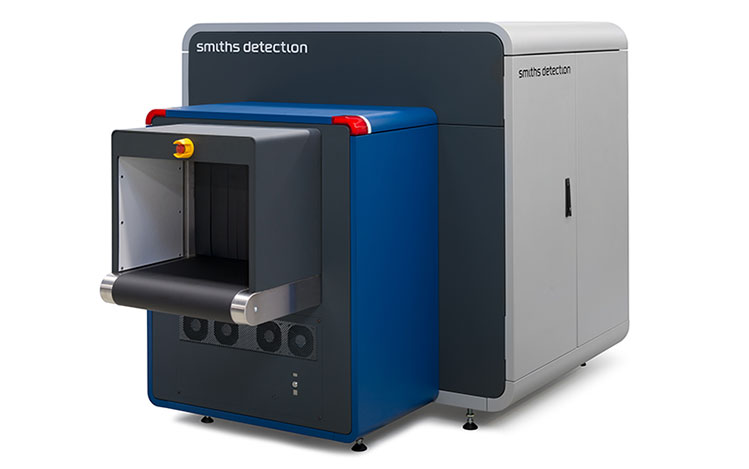
Richard Thompson, Global Market Director Aviation, Smiths Detection: “Integrating passenger data, border control systems and screening operations is definitely the way forward for aviation security. The goal is to enable free flow of passengers, belongings and cargo, and increase the security and operational efficiencies and effectiveness across the global aviation network.”
Smiths Detection is a Gold Sponsor at this year’s ACI Airport Exchange, where Richard Thompson, Global Market Director Aviation, is speaking in the Airport Security Summit. Ahead of the event, he shared some thoughts with Ross Falconer.
Smiths Detection has a strong presence at this year’s ACI Airport Exchange, where its focus will be on the key topic of Computed Tomography (CT) at the passenger checkpoint, along with several other developments such as the use of Risk Based Screening (RBS) and Artificial Intelligence (AI) which, Richard Thompson, Global Market Director Aviation, Smiths Detection, comments “are also set to revolutionise airport security”.
Thompson is speaking in the Security Summit at this year’s ACI Airport Exchange, where he will talk about Smiths Detection’s ECAC CB C3 approved HI-SCAN 6040 CTiX scanner which features CT technology.
“The arrival of rotating CT at the passenger checkpoint is undoubtedly a defining moment,” he says. “Regulators are pushing for its deployment in order to improve security levels, but it is also important to underline the equally attractive operational benefits.”
Security checkpoints are a critical point in the passenger journey and the correct strategy here can be pivotal to the overall operation of an airport. “Get it right and the result will not only be high levels of security, but also a cost-effective process, improved on-time performance for airlines, increased passenger satisfaction, and sustainable business growth,” Thompson comments.
The Smiths Detection HI-SCAN 6040 CTiX scanner has been selected by the US Transportation Security Administration and the latest installations have also recently gone live at Melbourne Airport’s Terminal 4.
“Feedback from both our worldwide trials and new installations remains extremely positive,” Thompson explains. “Our HI-SCAN 6040 CTiX scanner is demonstrating time and again at different locations that it is more than capable of meeting the demands of busy airports and immediately delivers impressive security and operational benefits. Excellent throughput levels are being reported, boosted by a combination of factors from a fast belt speed and low false alarm rate, to leaving liquids and electronic devices in baggage for screening, which reduces the number of images to check and also speeds up the process.”

The Smiths Detection HI-SCAN 6040 CTiX scanner has been selected by the US Transportation Security Administration and the latest installations have also recently gone live at Melbourne Airport’s Terminal 4.
“Enhance security, improve operational efficiency, increase passenger satisfaction”
The air transport industry forecasts a doubling of passenger traffic over the next 20 years. “Biometrics and RBS are recognised as effective ways to process more passengers through existing infrastructure and provide a more seamless passenger journey,” says Thompson. “This is reflected by a number of global initiatives, such as ACI’s Smart Security and ACI & IATA’s NEXTT.”
One of the top digital transformation programmes in airports around the world is the introduction of biometrics, which has already been incorporated into numerous touchpoints along the passenger journey. “It is integral to RBS and the opportunity to enhance security, improve operational efficiency and increase passenger satisfaction,” Thompson comments. “Security operators can spend more time with passengers they know least about or who represent the highest risk – and therefore provide the best experience for those they know most about and who are low risk.”
Meanwhile, over the last three years, upgrading hold baggage screening systems to Standard 3 has been a huge project for Smiths Detection, which recently received its largest-ever single order for hold baggage security scanners from Aena.
“With the Aena order, we will have installed around 500 advanced and approved systems in 50 airports not just in Europe but also across Asia, the Middle East and South America,” Thompson explains.
This new contract includes 163 ECAC Standard 3 approved explosives detection systems to be deployed at Madrid, Barcelona, Malaga, Palma de Mallorca and Gran Canaria airports. Smiths Detection is also supplying a further 62 scanners for out of gauge baggage.
Looking ahead, Thompson emphasises the importance of keeping ahead of the escalating challenges of new regulations, increasing passenger numbers and exacting business goals, all of which demand more complex solutions. “Systems must be flexible and future-proof, with reliable and effective interfaces and a network to drive and monitor productivity. Add to this extraordinary advances in technology and we are looking at a sea change in security.”







